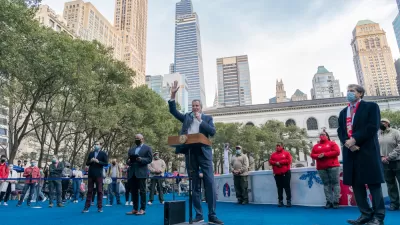Recent reports have documented an alarming rise in poverty levels across America. With the federal government cutting funding for social programs serving the poor, cities are stepping into the void by creating anti-poverty centers.
"Perhaps the most high-profile example [of city-led efforts to reduce poverty] is New York City's Center for Economic Opportunity (CEO), which raises public and private funding to test social service programs and reinvest in ones that work," observes J.B. Wogan. "In the realm of anti-poverty work, the CEO model appears to be catching on."
"This year Philadelphia Mayor Michael Nutter launched the Office of Community Empowerment and Opportunity, which goes by the same acronym as its New York sibling -- evocative of the corporate research-and-development approach that mayors hope will finally reduce urban poverty. "
"Mayors from several other cities, including Hartford, Conn.; Providence, R.I.; and Richmond, Va., have launched anti-poverty campaigns that mirror New York's in the past few years," adds Wogan. "In each case, the hope is that mayors can force state and local agencies to coordinate programs, collect better data on social outcomes and raise supplementary funds from the federal government and the private sector for effective policies."
FULL STORY: Cities Launch Anti-Poverty Centers

Trump Administration Could Effectively End Housing Voucher Program
Federal officials are eyeing major cuts to the Section 8 program that helps millions of low-income households pay rent.

Planetizen Federal Action Tracker
A weekly monitor of how Trump’s orders and actions are impacting planners and planning in America.

Ken Jennings Launches Transit Web Series
The Jeopardy champ wants you to ride public transit.

California Invests Additional $5M in Electric School Buses
The state wants to electrify all of its school bus fleets by 2035.

Austin Launches $2M Homelessness Prevention Fund
A new grant program from the city’s Homeless Strategy Office will fund rental assistance and supportive services.

Alabama School Forestry Initiative Brings Trees to Schoolyards
Trees can improve physical and mental health for students and commnity members.
Urban Design for Planners 1: Software Tools
This six-course series explores essential urban design concepts using open source software and equips planners with the tools they need to participate fully in the urban design process.
Planning for Universal Design
Learn the tools for implementing Universal Design in planning regulations.
Ada County Highway District
Clanton & Associates, Inc.
Jessamine County Fiscal Court
Institute for Housing and Urban Development Studies (IHS)
City of Grandview
Harvard GSD Executive Education
Toledo-Lucas County Plan Commissions
Salt Lake City
NYU Wagner Graduate School of Public Service





























